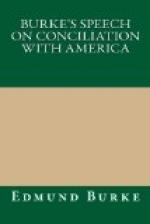I only wish you to recognize, for the theory, the ancient constitutional policy of this kingdom with regard to representation, as that policy has been declared in Acts of Parliament; and as to the practice, to return to that mode which a uniform experience has marked out to you as best, and in which you walked with security, advantage, and honor, until the year 1763. [Footnote: 54]
My Resolutions therefore mean to establish the equity and justice of a taxation of America by grant, and not by imposition; to mark the legal competency [Footnote: 55] of the Colony Assemblies for the support of their government in peace, and for public aids in time of war; to acknowledge that this legal competency has had a dutiful and beneficial exercise; and that experience has shown the benefit of their grants and the futility of parliamentary taxation as a method of supply.
These solid truths compose six fundamental propositions. There are three more Resolutions corollary to these. If you admit the first set, you can hardly reject the others. But if you admit the first, I shall be far from solicitous whether you accept or refuse the last. I think these six massive pillars will be of strength sufficient to support the temple of British concord. I have no more doubt than I entertain of my existence that, if you admitted these, you would command an immediate peace, and, with but tolerable future management, a lasting obedience in America. I am not arrogant in this confident assurance. The propositions are all mere matters of fact, and if they are such facts as draw irresistible conclusions even in the stating, this is the power of truth, and not any management of mine.
Sir, I shall open the whole plan to you, together with such observations on the motions as may tend to illustrate them where they may want explanation. The first is a Resolution—
“That the Colonies and Plantations of Great Britain in North America, consisting of fourteen separate Governments, and containing two millions and upwards of free inhabitants, have not had the liberty and privilege of electing and sending any Knights and Burgesses, or others, to represent them in the High Court of Parliament.”
This is a plain matter of fact, necessary to be laid down, and, excepting the description, it is laid down in the language of the Constitution; it is taken nearly verbatim from Acts of Parliament.
The second is like unto the first—
“That the said Colonies and Plantations have been liable to, and bounden by, several subsidies, payments, rates, and taxes given and granted by Parliament, though the said Colonies and Plantations have not their Knights and Burgesses in the said High Court of Parliament, of their own election, to represent the condition of their country; by lack whereof they have been oftentimes touched and grieved by subsidies given, granted, and assented to, in the said Court, in a manner prejudicial to the commonwealth, quietness, rest, and peace of the subjects inhabiting within the same.”




